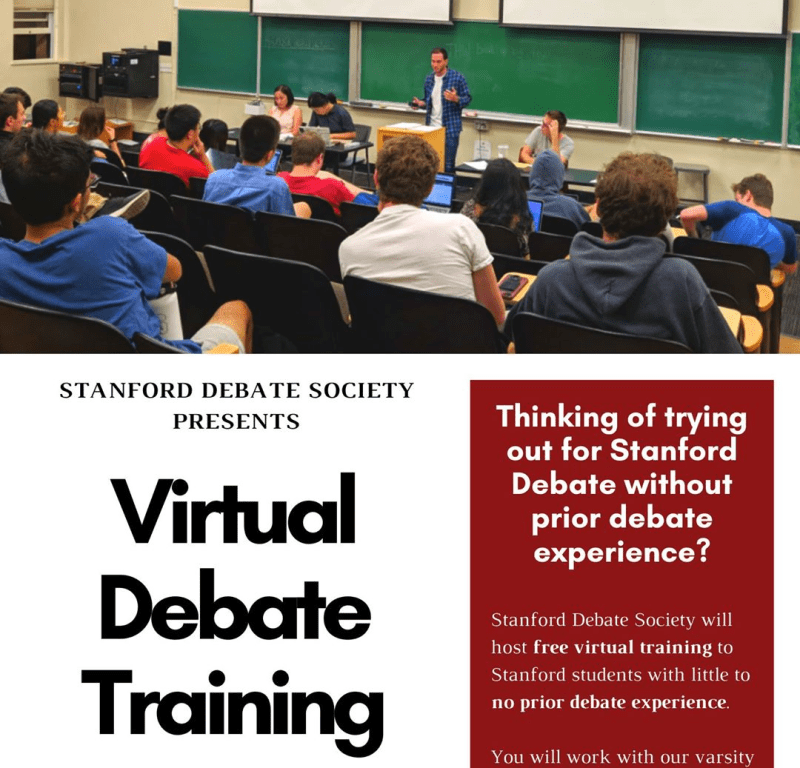While many extracurricular activities have been necessarily discontinued due to quarantine, others have adapted to the changing environment and carried on in different formats. The Stanford Debate Society (SDS) and Model United Nations (MUN) Team have both transitioned online and found ways to modify their plans.
Gaeun Kim ’22, president of SDS, said that she finds the virtual environment less rewarding since she can’t feel the passion and intensity of students’ speeches. She also recalls the red-eye flights the team took traveling to tournaments, and how travel enriched the friendships between the members. While team-bonding became more difficult, though, many members have competed in summer tournaments the team isn’t usually able to attend, thus increasing the regional diversity of the team’s tournament attendance.
“Students who are currently located in Asia, for instance, have judged at the Australasian [Intervarsity Debating] Champion trips, which is something that we normally wouldn’t do during the school year,” Kim said.
SDS is currently hosting Virtual Debate Training, a new program open to Stanford students who have little to no prior debate experience. The free training targets students who “want to equip themselves with basic public speaking skills that they may not have been trained in,” said Kim. “So this is an opportunity to give them a taste of college debating [to] see if it’s right for them.” The society also plans to host a second edition of the same course for incoming freshmen during the first three weeks of school.
Like past years, the team planned to compete in the World Universities Debating Championship (WUDC), the world’s largest debating tournament. Initially scheduled to take place in South Korea from late December to early January, travel restrictions have postponed it to July 2021.
Stanford Model United Nations Conference (SMUNC) usually hosts high school students on campus for a weekend in the fall. This year’s conference, though, will take place virtually from Nov. 12-15.
“To have the greatest accessibility for both student delegates and volunteers [SMUNC staff], we really thought that online with the best option,” said Zachary Gaber ’22, director-general of SMUNC 2020.
In terms of accessibility, an online format allows delegates who usually don’t live within travel distance or those unable to fly to campus during the school year a chance to participate. In addition, registration costs were significantly lowered, lowering attendance barriers. In 2019, early registration cost $80 per delegate and $80 per delegation. This year, pricing was reduced to $26 per delegate and $26 per delegation for the same round of registration.
“Given Stanford’s location in the heart of Silicon Valley and the timing of our conference, we are uniquely positioned to embrace this digital challenge head-on,” wrote Ethan Lee ’23, secretary-general of SMUNC, in an email to advisors and head delegates.
The selected platform to host the upcoming conference is Gatherly, which Lee describes as a combination of Zoom and Club Penguin. There is a 2-D space for delegates to share ideas, just like during an unmoderated caucus, and also a feature for breakout rooms, which mimics blocs formed for drafting resolutions. These components are meant to preserve the closest experience to an in-person conference.
“We’re also working with their [Gatherly] team to build some new features that are unique to SMUNC,” Lee said.
To uphold the 1:12 staff-to-delegate ratio as outlined by the Operator Service Center (OSC), the delegation capacity has been adjusted to 380, compared to 650 in past years. Stanford’s housing plans played a significant role in this determination, as a physical presence on campus may affect membership to student organizations. This modification is subject to change, though, as the University just suspended the plan to welcome frosh, sophomores and incoming transfer students on campus.
“In the spirit of Stanford’s strengths at the intersection of policy, technology, and entrepreneurship, our theme for this year’s conference is Leadership and Governance in a Changing World,” Lee and Gaber wrote in another email to advisors and head delegates.
Contact Vivian Chang at vivianchang2003 ‘at’ gmail.com.
